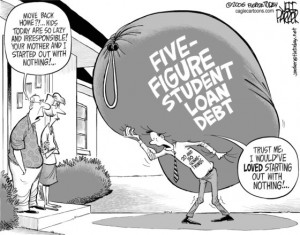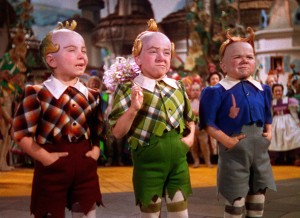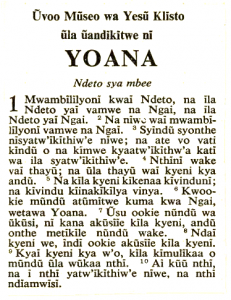A few weeks ago, my extended family took a little vacation together in southern Kentucky. We had met in a small town and the decision was made to go out to eat together at a local BBQ place on the outskirts of town. It looked interesting. It was a low-lying wood structure painted in bright orange and black with a gravel parking lot. You know what I mean — the type of place that probably had some unique local flavor, in both the food and the atmosphere.
As my brother’s family pulled into the BBQ joint, my twelve year-old niece turned to her mother and said, “Mom, you do know we’re black, don’t you?”
Oh. I should point out that my brother married an African-American woman and has three bi-racial daughters.
My niece was half-joking and half-serious. But because of her race, she felt a bit uncomfortable about entering this unknown place. And I can’t say I blame her. If you were black, would you have second thoughts about entering a local eatery in a small town in southern Kentucky?
As it turned out, they ate at the place and there was no problem, other than a few strange stares.
It is a very small incident, but it illustrates a couple of subtle but complicated dimensions to the way race works in our culture.
First of all, this little incident exemplifies one kind of white privilege. My nieces and my sister-in-law automatically have to go through a series of calculations in a situation like this: Am I going to be welcome? Am I going to be treated differently because of how people perceive me? How should I respond if I am? There are very few places where I, as a white person in America, have to make those calculations. My sister-in-law, and nieces, (and brother, by association) have to make those kinds of calculations fairly regularly.
This particular incident isn’t exactly a question of great injustice. There was not a question of the denial of economic opportunity, or whether rights would be violated, or whether my relatives would face violence, though the unknown can produce anxieties about such things. But it does mean that it can be difficult for person of color to feel fully at ease in many places in American society.
However, it still raises questions of injustice. If blacks still have to make calculations about how they will be treated (and due to the experiences they have, many and perhaps most African-Americans still do have to make these calculations), then we still have serious racial issues to face and address in our society. Beyond being uncomfortable in restaurants, there are still complicated racial questions about how hiring processes, law enforcement, housing patterns, and a host of other issues that we still need to face and figure out.
There is yet another rather complicated issue here that pertains to all of us. Should we try to be color-blind? Is that the best way to resolve these issues?
Here is how it usually plays out (it seems to me) in my extended family: most of the time we are color-blind. My sister-in-law is black. My nieces are mixed-race. My adopted sister (born in Korea) is Asian-American. The rest of us are white. We get together for holidays, vacations and other family events and we don’t think much about race. We largely see each individual as unique people that we love. We talk about what we do at our different places of work or school. We see personality quirks. We know what kinds of things each person likes for Christmas gifts. We know what kinds of flaws we all tend to be guilty of. We tell funny stories about each other at birthday celebrations.
The color-blind ideal, right?
Hmm. Here is the problem: in our color-blind way of thinking, those of us who are white sometimes forget the calculations that other members of the family have to make. So, we gather for vacation and we need to eat. Somebody says, “Hey, let’s try out that very interesting-looking BBQ joint,” and most of the rest of us agree, because we are not used to considering whether or not we will be welcome at an unknown place like this. And as several of our family cars pull into the gravel parking lot, only one vehicle contains somebody who is asking, “You do know we are black, don’t you?” The rest of us have forgotten.
Being color-blind, however, can also mean we have a blind spot. We fail to consider how things might look while standing in somebody else’s shoes.
Now, I don’t know how things would have played out differently if we considered race at that moment. It is quite likely that if somebody had asked the black members of the family if they would enjoy eating there, my sister-in-law would have said, “Hey, it’s OK, let’s try it out,” because she is used to these calculations and she’s tough. Or maybe she would want the rest of us to be comfortable and happy. But we never found out how she would have reacted because we were behaving in our usually color-blind way.
I would have more faith in the color-blind ideal if all Americans knew and loved one another to the extent that members of my family know and love one another. But the reality? It is only possible to know, on this level, a small minority of people we come in contact with on a regular basis. Furthermore, love takes work, even with people we know very well. Even if they believe in the color-blind ideal, I just don’t trust people to uphold it simply because it is a good idea. Shoot, I don’t trust myself on this matter.
On top of that, as my cognitive psychologist friend tells me, our brains are hard-wired to organize the world into categories. So we distinguish among mammals and trees and birds. We make distinctions among genres of music, TV shows and sports. As we drive down the road, we unconsciously note the difference among stop signs, stoplights and billboards. We assume certain things about people who are enthusiastic about NASCAR, or yoga, or Star Trek, or hedge funds. It doesn’t mean we get it right, but our brains have to organize the world into categories, or the world will just be a mass of chaos to us.
It is unavoidable. My friend Linda told me that a couple of decades ago, when she was living in New Orleans, her 2 or 3 year-old son asked her why all garbage men were black. It was an innocent question that illustrates the point: from the earliest stages of our lives humans make categories and connections to try to figure out the world.
Our culture has spent the last five centuries organizing people according to race. Those categories are not going to go away easily, or any time soon. We live with those categories and associations on a conscious and unconscious level. Picture a wide-receiver. Picture a CEO. Now try to do it without race as a category. You are probably able to picture either one as white or black, but I’m willing to bet that a black man popped up first in your mind for the wide-receiver and a white man popped up for the CEO. And you probably didn’t think about a female for either. Or a Latino.
So the color-blind goal? If being color-blind makes it easier for us to ignore our blind spots, then we need to find a different way.













